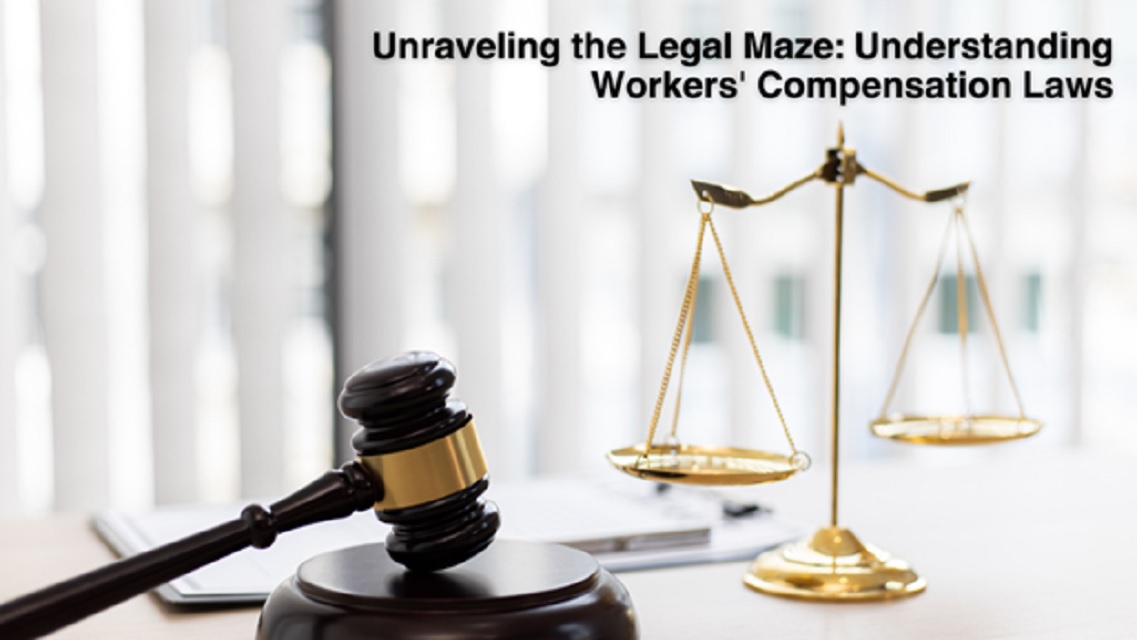Introduction
Navigating the world of workers’ compensation laws can feel like a daunting task for both employees and employers. These laws are crucial, as they protect injured workers’ rights while also establishing a fair, structured system that minimizes uncertainty and strain for all parties involved.
Imagine one of your employees suffers a serious injury on the job. Without workers’ compensation insurance, they could face devastating medical bills and lost income during recovery. As the employer, you would also be wide open to potential lawsuits over the incident. This situation becomes messy and costly, benefiting no one.
However, with a proper workers’ compensation policy in place, both parties receive coverage The injured worker gets medical expenses paid, replacement pays for time missed, and other benefits. Meanwhile, the company is protected from litigation related to workplace injuries. It’s a balanced setup intended to provide support for everyone involved.
The comprehensive guide aims through the nitty-gritty of these important laws and regulations. Look at their core purpose, what’s covered, exclusions to be aware of, and the practical implications to understand as an employer or worker.
Understanding Workers’ Compensation Laws
Workers’ compensation laws are designed to strike a balance between the interests of employers and employees. In today’s workplace landscape, both employers and employees need to comprehend the intricacies of workers’ compensation laws to ensure fair treatment and protection in case of workplace injuries or accidents.
For those in need of a trusted employment lawyer in Los Angeles, navigating the legal landscape can be daunting. However, several reputable law firms specialize in employment law matters and serve clients across the Los Angeles area. Consulting with an experienced employment lawyer Los Angeles provides invaluable guidance and support in understanding these laws and ensuring compliance with legal requirements.
Purpose Of Workers’ Compensation Laws
In addition to providing financial assistance and legal protection, workers’ compensation laws also serve to:
- Promoting Workplace Safety: These laws hold employers accountable for providing a safe work environment and compensating employees for work-related injuries or illnesses, incentivizing them to implement effective safety measures and minimize workplace hazards.
- Facilitate Prompt Medical Treatment: The workers’ compensation system ensures that injured employees receive timely and appropriate medical care, facilitating their recovery and return to work.
- Reduce Litigation: By establishing a no-fault system, workers’ compensation laws help minimize costly and time-consuming litigation between employers and employees, promoting a more efficient resolution of workplace injury claims.
Scope of Workers’ Compensation Laws
The specific scope of coverage can vary across states, but generally, workers’ compensation laws encompass a wide range of work-related injuries and illnesses, including:
- Sudden Traumatic Injuries: Such as fractures, cuts, burns, or injuries resulting from accidents involving machinery, falls, or motor vehicle crashes.
- Occupational Diseases: Illnesses that develop gradually due to exposure to harmful substances or conditions in the workplace, such as lung diseases caused by inhaling toxic fumes or chemicals.
- Repetitive Stress Injuries: Conditions that arise from repetitive motions or actions over an extended period, such as carpal tunnel syndrome or chronic back pain.
- Mental Health Conditions: Psychological or emotional conditions, such as post-traumatic stress disorder (PTSD) or anxiety disorders, that are directly related to a traumatic event or stressful work environment.
It’s important to note that specific exclusions or limitations may apply in certain states or for certain types of injuries or occupations.
Workers’ Compensation Claims by Industry
Certain industries tend to have a higher prevalence of workers’ compensation claims due to the nature of the work and exposure to potential hazards. According to data from the National Safety Council, the distribution of workers’ compensation claims by industry is as follows:

These statistics highlight the importance of implementing robust safety measures and adhering to workers’ compensation laws across various industries to protect employees and mitigate risks.
Benefits & Eligibility
Workers’ compensation laws provide a range of benefits to eligible employees who suffer work-related injuries or illnesses. These benefits are designed to support the employee’s recovery and ensure their financial stability during this challenging period.
- Medical Expenses: Coverage for necessary medical treatments including hospitalization, surgery, medication, and rehabilitation.
- Temporary Disability: Compensation for a portion of lost wages during the recovery period when the employee is unable to work.
- Permanent Disability: Long-term compensation for employees who sustain permanent impairments or disabilities as a result of their injury or illness.
- Death: Financial support for surviving dependents in the event of a work-related fatality.
To be eligible for workers’ compensation benefits, employees typically need to meet certain criteria, which may include:
- Employment Status: The employee must be considered an employee under the applicable state laws.
- Work-Related Injury or Illness: The injury or illness must have occurred during employment or as a direct result of work-related activities.
- Timely Reporting: The injury or illness must be reported to the employer within a specified time frame, as required by state laws.
It’s important to note that eligibility criteria and benefit levels can vary significantly among different states and jurisdictions.
The Claims Process
When an employee suffers a work-related injury or illness, the claims process is initiated to determine eligibility and provide the appropriate benefits. This process involves several key steps:
- Reporting: The employee must promptly report the incident to their employer, typically within a specified time frame.
- Medical Evaluation: The employee will undergo a medical evaluation to assess the extent of their injuries or illness and determine the appropriate course of treatment.
- Claim Filing: The employee or their employer will file a workers’ compensation claim with the appropriate state agency or insurance provider, providing relevant documentation and evidence.
- Claim Review and Decision: The claim will be reviewed by the responsible party (state agency or insurance provider) to determine eligibility and the appropriate benefits.
- Appeals and Disputes: If a claim is denied or if there is a disagreement over the benefits awarded, the employee may have the option to appeal the decision or engage in dispute resolution processes.
It’s important to note that each state has specific regulations and procedures for handling workers’ compensation claims, and it’s advisable to seek legal advice or assistance from experienced professionals if needed.
State-Specific Variations
While the fundamental principles of workers’ compensation laws are similar across the United States, there are significant variations in how these laws are implemented and enforced at the state level. Some key differences include:
Coverage Limits
Each state has its limits on the maximum benefits that can be awarded for different types of injuries or illnesses. These limits may be based on factors such as the severity of the injury, the employee’s wage level, or the duration of the disability.
Eligibility Criteria
States may have different criteria for determining who qualifies as an employee and which types of injuries or illnesses are covered under workers’ compensation laws. For example, some states may exclude certain occupations or types of work from coverage.
Calculation
The methods used to calculate benefit amounts, such as temporary disability benefits or permanent disability benefits, can vary significantly across states. Some states may use a percentage of the employee’s average weekly wage, while others may have more complex formulas or fixed benefit amounts.
Statute Of Limitations
Each state has its statute of limitations, which dictates the time frame within which an employee must file a workers’ compensation claim or appeal a decision. Failing to meet these deadlines can result in the loss of benefits or the inability to pursue a claim.
Due to these variations, employers and employees need to familiarize themselves with the specific workers’ compensation laws and regulations in their respective states.
Conclusion
Navigating the legal maze of workers’ compensation laws can be a complex and daunting task, but understanding these laws is crucial for both employers and employees. By unraveling the intricacies of workers’ compensation, we can ensure that injured workers receive the support and compensation they deserve, while also providing a fair and predictable system for employers.
Remember, workers’ compensation laws are designed to strike a balance between the interests of all parties involved, fostering a safer and more secure workplace environment. Staying informed about these laws and seeking professional guidance when needed can make a significant difference in protecting your rights and ensuring a smooth claims process.
Frequently Asked Questions
Can I Sue My Employer for a Workplace Injury?
In most cases, workers’ compensation laws prohibit employees from directly suing their employers for workplace injuries or illnesses. The no-fault system established by these laws provides a more predictable and streamlined process for resolving claims. However, there are some exceptions where an employee may be able to pursue legal action against their employer, such as in cases of intentional harm or egregious negligence.
What If My Workers’ Compensation Claim Is Denied?
If your workers’ compensation claim is denied, you have the right to appeal the decision. The appeals process typically involves requesting a hearing or review by an administrative law judge or a workers’ compensation board. It’s crucial to act promptly and follow the proper procedures for filing an appeal, as some strict deadlines and requirements must be met.
How Long Will My Workers’ Compensation Benefits Last?
The duration of workers’ compensation benefits depends on various factors including the severity of the injury or illness, the extent of the disability, and the specific laws and regulations of your state. Permanent disability benefits may continue for a longer period or even for life, depending on the severity of the impairment.







No Comments